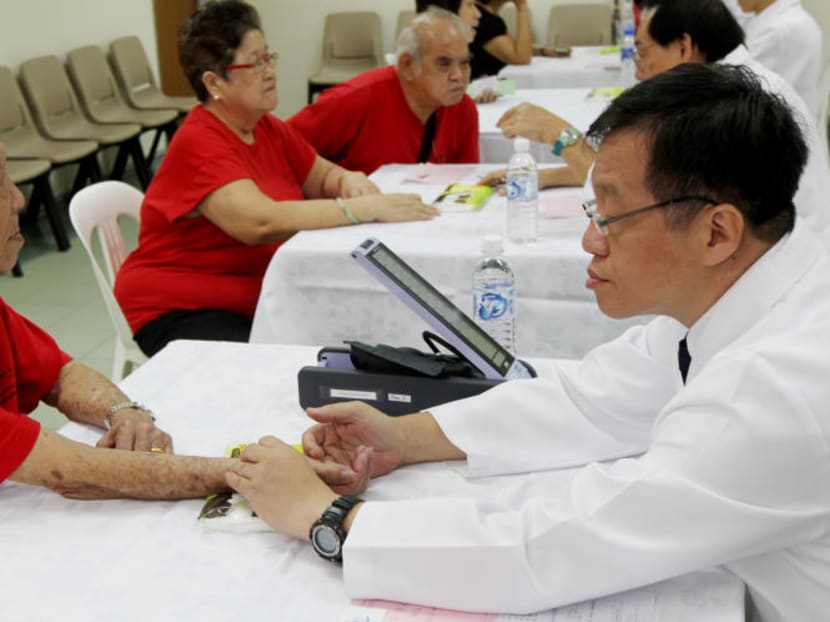Public consultation opens for proposed new Healthcare Services Bill
SINGAPORE – Members of the public can now give their feedback on the proposed new Healthcare Services Bill, with a series of consultation exercises to begin from Friday (Jan 5) to Feb 15 this year, said the Ministry of Health (MOH).

Public consultation has opened for the proposed new Healthcare Services Bill, with a series of consultation exercises to begin from Friday (Jan 5) to Feb 15 this year, said the Ministry of Health (MOH). TODAY FILE PHOTO
SINGAPORE – Members of the public can now give their feedback on the proposed new Healthcare Services Bill, with a series of consultation exercises to begin from Friday (Jan 5) to Feb 15 this year, said the Ministry of Health (MOH).
The bill is set to replace the current Private Hospitals and Medical Clinics Act (PHMCA), which was enacted in 1980 and last amended substantially in 1999.
The MOH plans to enact the new bill in the second half of 2018, and this will be done in three phases, starting with the existing PHMCA medical and dental clinics, and including clinical laboratories which will come under the new legislation from Dec 2019.
As Singapore’s population continues to grey rapidly, and with chronic diseases becoming increasingly prevalent, the MOH said in a press release that there is a “growing need for new care models and coordinated team-based care across healthcare settings and providers”.
New advanced medicine and healthcare technologies have also shaken up a scene previously dominated by traditional brick-and-mortar healthcare services, with services now delivered through mobile and online channels such as telemedicine or mobile medical services.
To accommodate the changing healthcare environment, the new bill is aimed at “better safeguarding the safety and well-being of patients....while enabling the development of new and innovative services that benefit patients,” said MOH. It also strengthens governance and regulatory clarity to ensure better continuity of care to patients, and better patient welfare.
Under the proposed changes, MOH will be empowered to step in to appoint an operator to help with the running of operations when a residential healthcare provider is failing, and this will be done “as a last resort”.
It will offer a temporary measure until patients can be transferred to other service providers, and will help protect patients against sudden discontinuation of residential care services. These services include nursing homes, acute care hospitals, community hospitals and in-patient palliative care centres.
MOH will also step in after measures like penalties, warnings or the appointment of a new management team have failed, and licensees will have right of appeal.
In addition, allied health and nursing services, traditional medicine and alternative medicine players will not be licensed at the moment, even though they fall within the widened scope of the new bill.
The Ministry is taking a risk-based regulatory approach to ensure that the authorities will be able to go after players who make “wild claims about how they can prevent cancer”, or how their services purportedly prevent or treat illnesses.
These professionals, which includes physiotherapists and traditional Chinese medicine practitioners, will continue to be regulated through existing Professional Acts to ensure patient safety.
The new bill will also make it mandatory for all licensed healthcare providers to contribute to the National Electronic Health Record (NEHR), and the first phase will see clinical laboratories contributing data by Dec 2019.
Subsequently, others like acute care hospitals, community hospitals, blood banking services and organ transplant services have to do so by the second phase in June 2020.
More time will be given to the last group - which includes general and specialist dental or medical clinics, nursing homes, telemedicine, renal dialysis centres, blood transfusion services - to comply, and they will have to do so by Dec 2020.
The NEHR data is mainly a summary record of a patient’s medical history, such as patient demographics, patient visits, diagnosis, discharge summary, and allergies. It can only to be accessed for purposes of patient care, and not for other reasons like assessment for employment and insurance.
While patients were previously allowed to opt-out, their data would still be uploaded to the NEHR, but was not accessible to healthcare providers. With the proposed change, patients who choose not to have any information uploaded to the NEHR will be considered on a case-by-case basis.
They will also be advised on the consequences of having permanent gaps in their record, and where their future care might be compromised should they choose to opt-back in later.
Under the new bill, the MOH will also have enhanced powers to gather data in the interest of patient safety, welfare and care, and public health, which may include national surveillance for the prevention of public health emergencies and safety monitoring for newer services. Previously under the PHMCA, it could only be done for audits, investigations of complaints, and breaches.
MOH will be authorised to publish information about non-compliant licensees and unlicensed providers.
Licensees will also be prohibited from providing prescribed medical practices and services that are likely to cause harm to patients, and these will be reviewed by experts and updated on a regular basis. Some examples of prohibited unsafe practices include: Skin whitening injections, colonic irrigation and chelation therapy (detox medicine).






